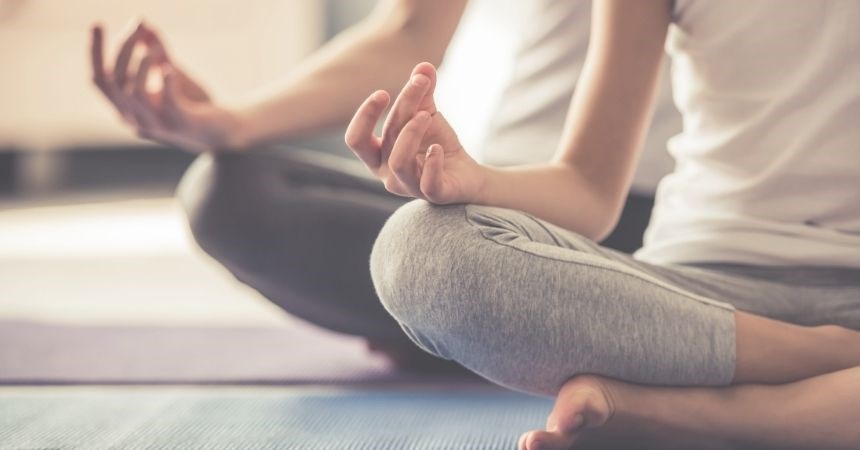I started my own yoga journey more than 15 years ago, and while it hasn’t always been consistent, I’ve learned to love and appreciate the practice and how much it has helped me over the years.
Yoga combines physical activity with mental calmness and gives us a safe place to relax our bodies and minds. People use different types of yoga to help with stress management, weight loss, flexibility, strength, and more. For me, yoga is first and foremost a way to relax, unwind, and improve my overall physical health. I can begin a 30-40 minute yoga session feeling stressed after a chaotic day; and by the time I’m done, feel relaxed, calm, and stress-free.
How can yoga help you become less anxious, less stressed, and more relaxed? Here are 5 science-based mental and physical benefits.
1) Yoga Helps You to Relax, Slow Your Breath, and Focus on the Present

It shifts the balance from the sympathetic nervous system (fight-or-flight response) to the parasympathetic nervous system. The parasympathetic nervous system is calming and restorative. When you can shift the balance, you can more easily focus your attention on something other than stress or anxiety. In addition to yoga, you can learn more about breathing exercises here.
2) Yoga Improves Your Mood
Certain poses, such as sitting in Lotus pose or getting up for a backbend, can help improve your mood. One study found a consistent yoga practice improved depression and led to an increase in serotonin levels and decreased levels of cortisol.
3) Yoga Improves Self-Esteem and Builds Confidence
In addition to improving your self-esteem and confidence, Yoga can also help you begin to feel more worthwhile. It can also help you access a different side of yourself where you are open to feelings of gratitude, empathy, and forgiveness, as well as a sense that you are part of something bigger.
4) Yoga Relieves Muscle Fatigue and Soreness
Many of us spend our workdays staring at a computer screen. Our bad posture and unconscious habits of scrunching up our shoulders and face can lead to chronic tension, muscle fatigue, and soreness in our wrists, arms, shoulders, neck, and face. Yoga will bring your attention to the places in your body where you hold tension. Once you identify those areas, you can decrease the behaviors that create the tension.
5) Yoga Improves Physical Health and Reduces Pain
Yoga can help you tone muscles, increase flexibility, and provide more energy and stamina. Yoga can also improve posture which can improve shoulder pain, neck pain, and back pain. According to several studies*, regular yoga practice reduced pain in people with arthritis, back pain, fibromyalgia, and other chronic conditions. When you relieve your pain, your mood improves, and you are more inclined to be active. Some of the major muscle groups we can strengthen through yoga include the biceps, triceps, and deltoids. In addition, the balance between stretching and strengthening is also beneficial to our body.
(*Sources: Annals of Internal Medicine, American Journal of Preventative Medicine, and Cochrane Library)
Furthermore, yoga has other physical long-term benefits. Over time yoga has been shown to lower blood pressure and slow the heart rate. A slower heart rate can benefit people with high blood pressure or heart disease. Yoga has been linked to lower cholesterol and triglyceride levels, and better immune system functioning overall.
Taking to the Mat
Yoga is a great way to improve your mental and physical well-being. There's a reason the practice has been around for centuries and continues to be so popular today. If you’re looking to relax, de-stress, and feel good, give it a try!
There is no right or wrong way to build a yoga practice. Each of us must figure out what we are looking to gain from yoga and what works with our schedule. Yoga classes at a gym or studio typically last around an hour. You can also find video and online options that last anywhere from 20-90 minutes, depending on the overall goal and intention.
The physical and mental health benefits of yoga are vast. You may be surprised at how you feel after just a few sessions.


